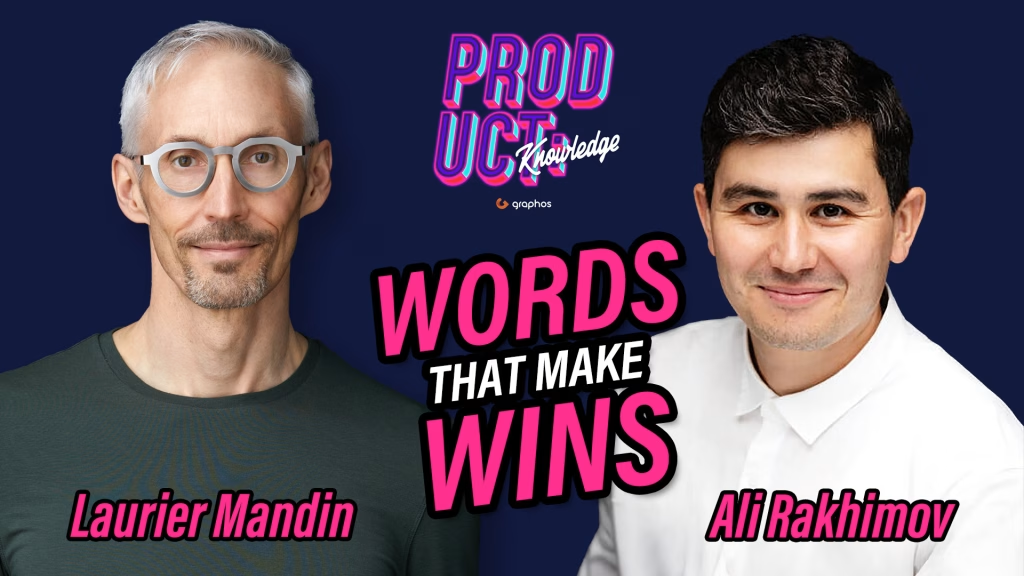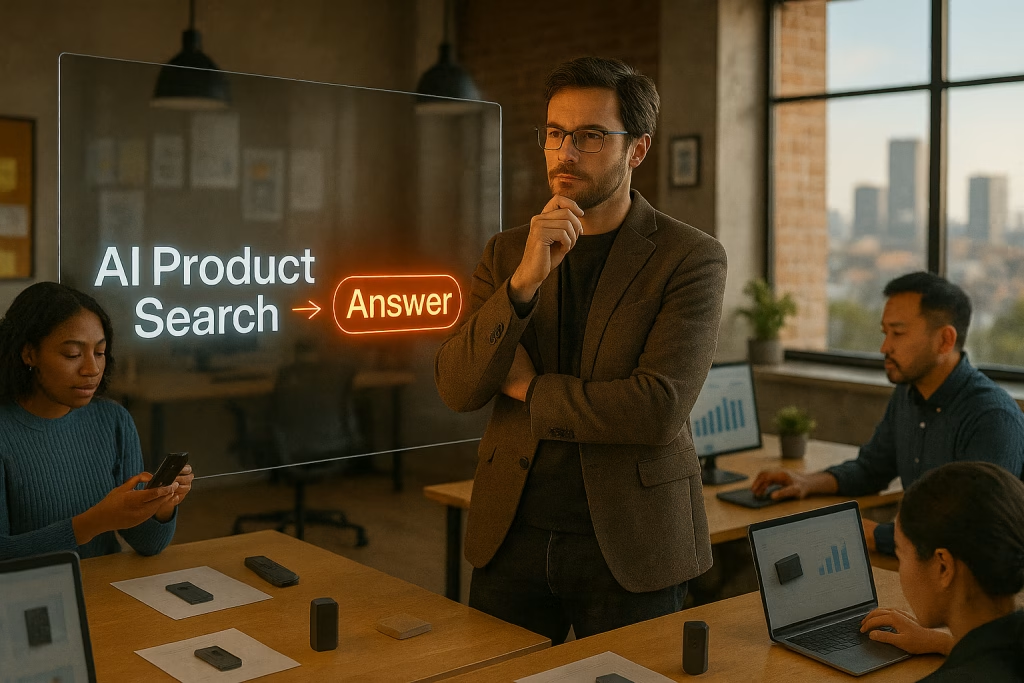With Laurier Mandin and Ali Rakhimov

Product manager, entrepreneur, and author Ali Rakhimov joins Laurier Mandin to talk about how better communication can make even the most ambitious products take flight. From building payment kiosks for K–12 schools to leading multimillion-dollar initiatives at Macy’s, Ali shares how simplicity, idioms, and “stupid” questions can cut through complexity and bring teams together.
This conversation dives into how to keep innovation alive, avoid “boiling the ocean,” and use AI as a force for clarity, not chaos.
- 00:02:00 — From the classroom to product leadership: How Ali’s early years in K–12 shaped his management style.
- 00:04:40 — Building, failing, and pivoting: The scrappy road trip that led to a startup exit.
- 00:06:30 — The power of idioms: Why metaphors like “Elephant in the Room” and “Boil the Ocean” make teams communicate better.
- 00:09:00 — Asking the “stupid” question: Turning imposter syndrome into clarity.
- 00:12:10 — Focus vs. shiny-penny syndrome: How to simplify and ship without killing ambition.
- 00:16:00 — AI hype and reality: What teams get wrong—and how culture determines success.
- 00:21:00 — Learning curve to lifelong learning: From calculators to ChatGPT, adapting to new tools.
- 00:27:40 — Making pigs fly: How Ali proved the impossible possible in K–12 fintech.
Find out more about Ali Rakhimov and buy “When Pigs Fly”: Ali.ink
Buy “I Need That” and get Laurier Mandin’s daily Need Feed emails: LMandin.com
Episode Transcript:
Laurier Mandin: Hey product people! If you’re interested in how the words we choose can make or break a product team, you’re gonna love this episode.
Welcome to Product: Knowledge, the podcast about creating and marketing products people truly need.
I’m Laurier Mandin, president and lead consultant of Graphos Product. My guest today is Ali Rakhimov, a former senior product manager at Macy’s, where he led more than $10 million in personalization and performance initiatives. Before that, Ali scaled Global Payment Operations at T-Mobile and co-founded a mobile first FinTech platform adopted by more than a thousand US schools serving low income families.
And now Ali is also the author of “When Pigs Fly.” It’s a refreshingly honest, fun-to-read guide to building better products through better communication, delivered in bite-sized pieces. In all his work, one thing that sets Ali apart is his ability to cut through complexity. As a self-taught immigrant professor without elite credentials, Ali built his career on clarity, empathy, and execution.
And that perspective really resonates whether you’re a founder, a PM or an operator navigating high stake systems and messy org dynamics.
In When Pigs Fly, Ali explores idioms and popular metaphors, phrases like “training wheels,” “spending dollars to save dimes,” and “sell the sizzle, not the steak,” to translate product management into lessons people think about and carry forward. It’s all about simplifying communication.
Ali and I are going to talk about the reasons communication so often breaks product teams, the underrated power of asking “stupid” questions and what he learned leading multimillion-dollar projects without the so-called “perfect” resume. Ali, welcome to the show.
Ali Rakhimov: Thank you, Laurier. Thanks for having me. I really appreciate it. Look forward to an amazing conversation.
Laurier Mandin: There’s a really great and unconventional storyline to how you came to be a product manager. Let’s start by telling us about that.
Ali Rakhimov: Yeah, right outta college I worked in K-12 trenches. Initially they hired me as a business manager because I majored in business, and then later they’re like, Hey, we need to you to wear multiple hats. So they’re like, Hey, why don’t you be lunch coordinator, PE coach, and dean of students. And so, uh, right outta college, I learned how to kind of manage multiple things, work under pressure.
And I tell everybody educators are really good at product management because they know how to communicate well. They know how to manage expectations and really work well under stress. So once I worked about seven years in K-12, I got this again with just like anybody else, I got this entrepreneurship itch and I’m like, I need to do something else. I’m really bored of sitting in the office cubicle and just licking envelopes, sending invoices, you know, so originally I did my master’s and I was gonna become a CPA. After two exams, I’m like, no, I think it’s, I’m more rebellious.
I like to go outside. I’m not an office person, so ended up being my observation. I said, okay, within K–12, there are two issues that, that I’ve observed that I can really disrupt. Again, the word disrupt was really mentioned everywhere. So I was like, okay, let me use that word to disrupt it. So it was either attendance using some kind of IoT, because, Here in Arizona for instance, we manually through pen and paper would take attendance and that’s what states use to fund schools.
So I was like, can we do like some IoT automation type of stuff? So I would go to China and they were using a lot of stuff, but there’s a lot of privacy issues. So I was like, yeah, I don’t want to get into that. Then I said like, payments was another thing when I was managing multiple schools as a business manager, you had to collect money for little Johnny’s lunch, extracurricular activities, athletics, and all the other stuff. And, we had issues where people would steal money because little Johnny doesn’t care about receipts, We had issues where filtered money gets lost.
And I, as a business manager, I never had access to real time data. So I was like, I really wanna address this issue, uh, of quickly being able to collect from parents, payments at the front desk and also be able to have access to this data instantly for accountants and financial kind of folks at the back end of the room, at the school.
So that’s how I started. We went to China, got my co-founder, put all these peripherals together, created our first payment kiosk for schools, and just took a van from Arizona all the way to New Jersey, going school to school and selling it.
Laurier Mandin: And where did you go from there?
Ali Rakhimov: I thought after working seven years, I knew everything about K–12. But that journey, like we had three round trips, from Arizona to New Jersey and kind through rural America, the middle of America. And meeting so many school admin superintendents and business folks. It was so fragmented. Everybody was doing stuff and I would learn a lot of stuff and one thing we found out is like this hardware scaling this 200 pound machine and connecting with everybody’s school attendance where they have a lot of errors and fixing their accounting issues, it’s really hard for a small team. So, but one thing we realized, which was interesting, a lot of those schools. Uh, had PayPal buttons, right. It was like, oh, interesting. So we just took it and said, we pivoted into fully SaaS and mobile and scaled to thousands of schools. Like we made onboarding easier and eventually exited to a strategic.
So, through all those mistakes all kinda me giving hard time to our engineers and building features that nobody wanted because I thought if you build it, they’ll come or school said, Hey, if you build this, we’re gonna fill out this RFP, all those failures, I was like, learn about product management and um. Those kinda ui ux kind of cool buzzwords, which were very foreign to me and found out I really love this, finding amazing solutions to problems. So that’s how I got into product management, after kind of failing and eventually bootstrapping and exiting my startups.
Laurier Mandin: You said if you build it, they will come,” And that’s one of the great myths of product management and it’s also an idiom, which is, you’ve written this book, ” When Pigs Fly,” and it’s a grand collection of idioms. Tell us about that book and how that came to be.
Ali Rakhimov: Probably you can guess from my accent, I’ve been in the US for over two decades, but, I’m originally from a little country called Tajikistan. I came as an exchange student to learn all about democracy and the ways of operating in a democratic system in the US And then I ended up staying, going to college and having kids here and getting a job in the United States. Even though I did my bachelor’s and master’s, every time I’d go to those meetings or other stuff, I would feel like a bit kind of not in my own plate. And it’s because English wasn’t my first language. Eventually, I think this, like this whole idea of it was like kinda a napkin idea again back in 2019 when I worked for a private equity-backed company who had a lot of McKinsey consultants and they would come and they would just present amazing kinda selling the vision and future.
And I was like, wow, this is so amazing. And one thing I was like noticed that I was really amazed by the kind of verbiage or idioms they use the phrases, Hey, “the juice is not worth the squeeze,” or some other stuff. And I was like, I love it. And I started using it for myself. And every time I would use it, I would feel like, wow. Like people regarded me differently and I was like, okay, this, this is good. This is part of growing intellectually, right? It started like that. And then, I had a big notebook of writing all those idioms. and eventually, I was mentoring my nephews nieces and I was like, this is, maybe I’ll just kind of put together a book.
Why not?
Laurier Mandin: The idioms are just as you said, it’s kind of this thing that brings people together. It gives you this common language that sticks with people. One that stands out to me and that I use a lot because it’s so relevant to almost all the clients I work with, is ” Elephant in the Room.”.
With almost every product launch I’ve ever done, there is an elephant in some form in the room. There’s this bugaboo and obvious point of failure that everyone wants to ignore and you do it at your peril, and for whatever reason, you know, the reason that became a metaphor is ’cause there’s this really big thing and nobody dares point it out.
How have you seen unspoken truths that derail product teams because of an elephant in the room? And what’s your advice for PMs who need to point out that elephant without blowing everything up, or to give them the courage to do that?
Ali Rakhimov: Interestingly, you’ll be like shocked when I had Skoki, which is that payment kiosk for schools, o ur main kinda, my card was a big elephant, and it’s this elephant in the room that within K-12 where there’s close to 50 billion that gets processed for all those transactional for 55 million students. The biggest elephant in the room was fraud. A lot of people steal money. And so that’s what I would use a lot of times. And that’s why we’re trying to bring transparency and instant payments into that K–12. So that was kinda how we started it. And going back to your other question is like, we want to change something from the root cause, but also not “boil the ocean,” as I call it. That’s another idio. It’s
Laurier Mandin: Yeah. Yeah,
Ali Rakhimov: That’s a delicate balance.
Laurier Mandin: And that’s a great one.
Ali Rakhimov: That’s a very delicate balance. I’m not gonna say I’ve mastered it. This takes time at every company, every culture, every setting is different. So as a product manager, you really have to adapt. you have to kind of really understand the context, your audience, and then. For whatever you’re gonna fight for, is it worth dying in that hill? You know, that’s what I say. Uh, there’s
Laurier Mandin: Yes.
Ali Rakhimov: you choose and, uh, maybe you will lose some battles, but you wanna play a long game to win the war. So, um, yes, to your question, it, it just depends.
It’s very delicate balance.
Laurier Mandin: I was going to ask you about the one, “boiling the ocean,” because that’s another metaphor that I really like, and again, because it’s so common. most of the founders I work with also run into the challenge of just too many, just directions. Too many distractions, not enough focus. very often they’re trying to do something that’s kind of a task that’s bigger than what they’re able to do at the moment.
How do you coach teams to know when they’re drowning in detail? trying to boil the ocean. And do you have practical steps to narrow the focus without bringing down everybody’s ambition without taking the excitement out of what they’ve built up to.
Ali Rakhimov: I kind of quote unquote call myself a blue collar PM because I like to do by making mistakes. I like to go out there instead of using theory, just go and do stuff. Like if we believe in it, why not? One of the things I try to do is really zoom out. And maybe it sounds naive, but like why are you doing it? What’s the goal? Right. And zooming out really helps you kind of get out of this kind of bubble that you are in all the time. A lot of, and I find it myself as well, you have so much bureaucracy, especially if you are in the enterprise kind of stuff, where it’s a very matrix organization. And there’s so many different stakeholders, you forget the why. You really forget the overarching goals. And I think it helps to kind of zoom out and say, here’s the impact. Here’s what we’re doing. Let’s forget about these edge cases. Let’s forget about these outliers. Here’s what we’re gonna do. Let’s simplify, progress over perfection, and let’s focus on the main thing and try to boil down to one thing.
Because again, as you mentioned, not just for enterprise, but in startups, you try to chase different rabbits and you kind of lose sight of them all. So
Laurier Mandin: Yes.
Ali Rakhimov: One thing I suggest is just really, truly knowing why you’re doing it and then ruthlessly going towards that, even if it means failure, but you learn through that.
Laurier Mandin: Yes. When you’re working on a product too, everybody gets super attuned to seeing what competitors are doing, seeing what all the options are, and you get what I sometimes call “shiny penny syndrome. ” Every little thing, every feature that we should have and everything the app could possibly do or the tool could do, somehow works its way onto everybody’s mind.
And then you end up with a very bloated product. You’re trying to, boil the ocean, you’re drowning in detail. I find that very often drilling down can be the hardest thing of all because you don’t want to tell people not to be excited thinking about all the things you can do, how you can change the world.
It’s like maybe we haven’t even come upon the big idea yet of how we can change the world. What do you do to reign that in so They don’t think they should stop imagining the what ifs and the potential, But to still stay focused.
Ali Rakhimov: One of the things that I like, this is a long-time culture within Atlassian was that they would have Fridays do like kind of crazy stuff, right? Like they will just dedicate the full day just to go crazy. Just to like, I mean, with product, we cannot code, so we don’t have hackathons, right? But we can have those crazy ideas, discovery, and kinda all the craziest ways to bring adoption for your app or something, right? For instance, when I worked at Macy’s, I was like, Hey, we have all these stores. Why don’t we do Macy’s at Night?
Why don’t we provide access to our most loyal customers to come at night and shop? Because after six, the kids go to bed or whatnot, right? So Macy’s at Night was something that we came up with, like, or why don’t we just shut down the whole website for the whole day and like. People go to the app to use it, right? Like, so those type of stuff, like this happens like when we kind of go in like crazy Fridays, we called it, which I love.
Laurier Mandin: Bold ideas. you know, you could shoot any of those down and bringing them up when people have the wrong mindset, it’s going to happen. Somebody’s gonna say, no, we’re not gonna shut the website down. We’ll lose a fortune. Or if we open an off hours, now we’re going to mess up people’s shopping routines or whatever.
And there’s always pessimism that is brought up to deflate and defeat new ideas. So I love the idea of having kind of this open door to boldness where you bring forward the ideas and people can be fearless about doing that, rather than knowing that anything new in this environment tends to get shot down.
So we don’t bother, we just keep doing what we’re doing. It allows for innovation to pour in instead of the fear that stifles it.
Ali Rakhimov: And there’s so many examples that I took in my book, for instance, when I came, back in 2002, Blockbuster was a huge deal, like just to rent a what? Like I got a stipend of $125.
Laurier Mandin: Yeah.
Ali Rakhimov: And one rental cost, $20. It’s like, man, this is expensive. And there were lines, and you had to wait for those DVDs So it was very expensive, but like you could say, Hey, if it works, why break it? Right? Who cares about mailing? Who cares about streaming?
Laurier Mandin: Yes.
Ali Rakhimov: Right? So that’s…
Laurier Mandin: Blockbuster did say that.
Ali Rakhimov: Yeah,
Laurier Mandin: Right? Remember Blockbuster?
Ali Rakhimov: So, but Netflix came and I was like, Netflix doesn’t mean everybody will have success. I mean, certain stars have to align, but timing wise, Netflix was really successful with their mailing DVDs.
I would use it. I loved it. And I was, even at that time, I was scratching my head when they said We’re, we’re stopping DVD stuff, we’re doing full streaming. Everybody’s like, wow , look where they’re now.
Laurier Mandin: I actually never did mail order DVDs. I was big on Blockbuster for rentals and going to the store and picking things up. And I was kind of skeptical when Netflix came out thinking, oh, that’s just too much data. You’ll never be able to get the quality. And at that point we didn’t even know what quality was. We didn’t have 4K, We didn’t have HD even at that point, I don’t think it was just SD and it was ambitious at that time. So it’s really interesting to see where we’ve come and just how, as you said, for those listeners who don’t know what Blockbuster is, it’s where we used to all get our movies before Netflix and they failed to adopt.
They just closed their mind to it and let someone else come in and harvest a market that they entirely dominated.
Ali Rakhimov: And yeah, that’s, what we call stagnation in product management, where you are just too comfortable and you become paralyzed by your own quote unquote success. And I think right now it’s kind of similar. It’s like foundationally, a lot of companies, especially in tech, do not have the infrastructure for AI, but everybody keeps putting AI, AI this, AI that. And like they don’t even have the data, they don’t have the right infrastructure, deployment, but everybody gets like for PR reasons or whatnot, wants to do AI. And I was like, okay, so AI is just automation, like better automation, right?
So you can do a lot of stuff with even without using, but it’s good PR. So
Laurier Mandin: Yes.
Ali Rakhimov: Everybody wants to be at the forefront of great PR.
Laurier Mandin: I think everybody’s really afraid of falling behind. If it’s going into 2026 and you don’t have AI, then you must be hopeless. so everybody feels they’ve got to work it in. It’s no longer a feature or a step up, it’s the catch up game is to figure out how.
It’s funny. I use Peloton. I’ve been with the system for over five years, and they’re just now bringing AI into their platform. That’s something I’ve been talking about that should have it because it’s this very, very personal business where everybody’s got their own unique fitness routine and everybody is just doing what everybody else does without AI, and it’s so glaringly obvious now, especially when you have a digital platform like that and AI isn’t a part of it.
It’s like you’re just doing sfuff for the masses. You’re not even having anything that’s customized, that doesn’t pay attention to, you know, you’ve got all this data on your heart rate and your performance history, but you’re not doing anything with it. To me, that was just kind of this huge waste.
So it becomes kind of glaringly obvious when you aren’t bringing AI into the offering at this point. People realize what it can do, and we feel that at this point we need that. It’s becoming the baseline. It’s more than how are you going to do it?
It’s how will you use AI to do the thing that you’re doing? And if you’re an existing platform, it’s how are you going to take advantage of AI to make superior performance, superior outcomes for your customers so they stay with you.
Narrator: Ever wonder why some products fly off shelves while others collect dust? The difference isn’t luck, it’s psychology “I Need That” reveals the brain science behind products people can’t resist learn why we buy what we buy, and how to make your product the one they absolutely must have. From the psychology of needs to the secrets of scaling, this is your roadmap to product success.
“I Need That” by Laurier Mandin. Available now in print ebook and audiobook formats at Amazon and LMandin.com.
Ali Rakhimov: A hundred percent. And the biggest question is like, are you able to afford $500 billion scientists that everybody keeps gobbling up, right? Like, how are you gonna be at the forefront when they cost so much? It’s very interesting just to observe because the speed of which, like certain things changing, It started with text prompts then it’s like video.
Then it’s like you can build an app. Then Lovable came and all this, reps and others, I’m like, “Wow, look at that!” And it’s changing so fast. And so like baseline, like the yard stick keeps changing all the time. Then you don’t know what, how to even find that baseline. That’s kinda one of the hardest things.
Laurier Mandin: What do you do in your work to define the baseline or to, stay on track to, when we talked about the shiny penny syndrome. There’s nothing shinier than AI right now, but to make sure that your teams use it effectively, so that they’re not just using it because they feel they have to, but because it’s going to be more profitable and more effective?
Ali Rakhimov: I think, there’s two ways, right? One of the ways is like, AI has a bad name because of all the layoffs, right? And people just like hate AI because it impacts their livelihood.
Laurier Mandin: It’s Gonna steal my job. Yeah.
Ali Rakhimov: On the other hand, it’s a culture of like, Hey, can I use chat GPT to create my PRDs?
Can I use Chat GPT to write test cases? So for instance, in our work environment, they allow it, it’s like culture wise, if you create openness where in transparency where people can share,
Laurier Mandin: Hmm.
So I think it starts with every company’s culture, their attitude towards AI and how they treat their colleagues and employees who actually leverage that. If they’re punishing them, then that’s gonna get tough. But if they’re actually incentivized using it, slowly it’ll creep into all these conversations within your standups, within your architectural discussions and all of that. So I think culture for me, based on my observations, is the biggest thing and makes me even take more initiative to talk about certain tools that I’ve used and open up.
Laurier Mandin: I’ve done that with my team, and I’ve had that happen even with client teams where the client has come to the group and said, all right, I want everybody to bring forward how you can use AI in your role. I want you to think about how you can use AI to make your work more effective and to make us better and stronger.
Ali Rakhimov: And then you can create a Slack channel or even like Friday meetings where like, Hey can you guys share? And people will share. They’re like, Hey, here’s what I’m using. Here’s like, and you will learn just by through comradery throughout the community, if you have that transparency and culture where AI is not looked down upon as looking at you like, oh, you’re lazy, or you’re like cheating, instead of like, Hey, you’re really 10 xing this productivity, you’re doing all this kind of cool stuff.
I really like that approach as opposed to the who’s cheating here with AI, we’re gonna catch you. It’s similar what I see happening with my kids in school. I’ve got one that’s just entered high school and there’s two distinct points of view on AI. One of them is, you’re going to use it to cheat and to fake your performance.
And the other one is, AI is here to stay. How are you gonna use that in everything you do to make yourself better and to become the best you can at leveraging it to be the most effective you can, the most efficient you can at everything you’re doing. To me, that second one is where we’ve gotta get to, right?
There’s no point fighting it. If you’re not using it to do that stuff then someone else is, and that’s who’s going to take your job, not the tool itself. It’ll be someone who knows how to use that tool better than you do.
Ali Rakhimov: Absolutely. And this reminds me back in 2002 when I first came to the US, I was born in the Soviet Union, so everything in the Soviet Union when it comes to math was pen and paper. You had to do it. You couldn’t use a calculator because that would be cheating. Came to us and everybody had these big Texas calculators that I’ve never seen before and I was like, I would try to ask teachers all these questions manually.
And it’s like, are you crazy, Ali? No, I’m not gonna show you. Use your Texas calculator. So it was a learning curve to kind of start using the Texas calculator to do my math, my calculus. But yeah, there’s a learning curve for sure. Uh, but
Laurier Mandin: Yeah.
Yeah, and it’s very similar in my daughter’s grade 10 math, they’re required to learn how to use a scientific calculator to do their work. And that becomes something that from there on.
Is one of the tools of the trade. It’s only when schools start teaching kids how to use these new tools that the schools are actually correctly doing their job as opposed to trying to find better and better ways of detecting when someone is using one. I think there is real value to having people write freehand and to be able to think on the spot. And those are the new things we’ve got to test. And if we’re bringing somebody into a workplace and we wanna test their capabilities, we’ve gotta test their ability to think critically, to quickly and efficiently and their ability to use the newest and best tools, which they have to continue to tweak as things change. And that’s one of the biggest things in my work that I find is it’s not just a learning curve to start using tools like AI efficiently, it’s this ongoing learning pathway. You’re on the bus, and you just have to keep on staying ahead of where it’s going next and learning what are the alternate tools, the alternate methods, there’s just all these different layers of stuff. How has that affected your work in that the tool set you use has changed so dramatically in the last couple of years?
Ali Rakhimov: Every PM has its own ways of working, right? for me, I was always, what I call kind of traditional was like, Hey, I’ll talk to business, to understand what the pain points are. so as I said, I think PRD writing, PRD writing test cases, the time spent on it drastically changed for me. Definitely use Chat GPT for that. And, it’s also as part of doing that, it helped me kinda really bring those outliers, bring certain stuff I never thought about. Right. It kinda helps you. It was like, wow, that’s interesting. I never thought about it. So it brings those discussions when we have those discoveries with engineers, like, oh, here’s another stuff.
It’s like, yeah, like, why don’t we bring these alerts and metrics into the picture? Can we configure this ahead of time? You know, so I think it accelerates additional stuff, proactively, instead of coming downstream.
Laurier Mandin: This is interesting. So many of the things you brought up are on a different tack from the questions that I was expecting to ask you in this interview. You know, I was gonna focus, on these great idioms you’ve got in the book. They are so valuable to know.
And they do tie in with the work that you do day to day. You mentioned earlier that you like to be in a position where you are afforded the ability to learn from mistakes, to, go off script, and to ask the “stupid” question.
Can you tell me a time when asking the “stupid” question was effective for you and where it actually broke the ice or it moved you ahead from where you would’ve been if you had stayed quiet and hadn’t asked that question.
Ali Rakhimov: I don’t think I’m the only one who’s been in the position where they go to a meeting full of like 20, 30 people in Zoom and some abbreviation is used. And nobody wants to ask what the hell that abbreviation means, because they don’t want to be looked at as someone who’s silly or doesn’t know it.
Laurier Mandin: Absolutely.
Ali Rakhimov: We have imposter syndrome and we don’t wanna come across as not knowing certain stuff.
Laurier Mandin: Yeah. Why is this guy here if he doesn’t know what that is? I don’t know what’s worse if you’re in a big room or in a small room. If you’re one-on-one, then you risk the person you’re talking to who might be a superior looking down on you.
And if you’re in a big room, you have, everybody can look down on you. But most often when you do ask the stupid question, there’s this collective sigh of relief because everybody else wants to know the answer to the same thing.
If you bring down the bar of, of what kind of questions are acceptable, you open doors for others to do the same.
And now it takes that posturing out of the room as well. It’s like, oh, humility is welcome here.
Ali Rakhimov: A hundred percent. And I think this kinda Socratic method of just asking basic questions, rudimentary questions, really focuses the whole group on solutioning instead of pointing, right? Like you could be with engineers or architects, or which system impacts which other system, who needs to do what, updates where.
But when you start asking questions. It kinda leads to common sense. And it eliminates all this, needless drama and potential, kind of hotheads.
Laurier Mandin: And that’s a really great opportunity to bring an idiom into discussion as well. because one thing I find with these idioms in reading through your book, I was thinking a lot about why it is that these things are so widely used. Some of them you’ve heard hundreds of times even. There’s a couple of reasons. One of them, it gives us a common language that we can speak to each other in a way that we’re all understood. And the other thing is it takes whatever is going on and puts it in a context where we can look at it more objectively.
If we’re talking about, “we’ve put a screen door in a submarine” here Now everybody thinks, what does that mean? How does that relate to this? So everybody steps back and looks at this problem from a different angle. Collectively we say, yeah, we’re trying to fix cuts in a screen door in a submarine, and we’re all gonna go down if we don’t look at the bigger problem.
There’s some really big magic about putting an idiom on the problem. And I think that’s why these things have always persisted. It brings us down to a different baseline, and now we’re looking at that elephant.
Ali Rakhimov: Yeah, I couldn’t have said it better. My journey started with not being a native speaker. And, digesting certain things takes more time. But if you use the idiom. Elephant. Oh, okay. Comparatively, in my head, I visualize a big elephant. Oh, okay. Now it makes sense, right?
So it’s not only kind of through amazing storytelling, but it also comparatively kinda explains to me things faster. So I didn’t get cemented in my brain faster. So that’s why I, I love those.
Laurier Mandin: Yeah, exactly. cementing things in your brain and kind of making them stick, making them stay around, so you’re thinking about them a little bit longer. And so you give the right attention to the things that need it. And the title of your book, When Pigs Fly, it suggests making the impossible possible.
Ali Rakhimov: Within product management as, and you know, like with product, like when you do from scratch, especially if it’s a hardware IoT and you want to disrupt, something like Square did, I was so obsessed with Square because they use sound waves to process payment. I was like, oh my gosh, this is so amazing.
And leveraging existing sound, to make it happen. I was like, this is so amazing, you know? So, yeah. And because of that, I wanted to say something that’s impossible can be possible.
Laurier Mandin: In your career, looking back, what is the biggest pigs fly moment that you’ve ever had?
Ali Rakhimov: I started without knowing anything about software payments. All I knew was I wanna make sure that parents can pay within seconds. And admins in the back room can get access to it in real time. But of course it’s easier said than done.
And my first biggest challenge within payments was the banks were like, here’s the 40 pages that you have to do through underwriting to open a merchant services to be able to collect payments. And I had 19 rejections. The 20th actually said, yes, one bank, we finally got some APIs. And this was the age of gig economy and platforms where Uber lived doing quick payments, micropayments, right? So it was just starting and we were the first kinda what we call payment facilitation model, where we’re gonna take risk because we know the risk, because, for instance, within K-12, the default rate for little Johnny’s lunch is 0.00025. Nobody has a chargeback on lunches or field trips.
Because their kids have to eat and their kids have to go to a field trip and they have to attend sports. So nobody, so when we would go and talk to the bank saying, Hey, the specific for this niche, the default rate is so low, we don’t need all these 50 things that you could apply for online potential fraudsters, eBay, or restaurants where there’s a high chargeback rate and they were like, no, this is a cookie cutter approach. Everybody has to go through it.
So for us, like once we were able to finally build the infrastructure that I always envisioned using other banks as APIs where schools can come up and within 20 minutes at their bank and start collecting and they didn’t need anything, I loved that, there was like that kinda aha moment and kind of the Wow moment for me as well.
Laurier Mandin: That’s it for this episode of Product: Knowledge and my conversation with Ali Rakhimov, author of “When Pigs Fly.” You can find out more about Ali and his work at Ali.ink. That’s A-L-I dot I-N-K. And be sure to pick up the book on Amazon. You’ll find links in the show notes.
Be sure to also visit graphosproduct.com, where you’ll find all the podcast episodes with transcripts plus tons of insights from our blog. And you can subscribe to my daily emails or get a copy of my book, “I Need That” at lmandin.com. Thanks for listening. I’m Laurier Mandin.





